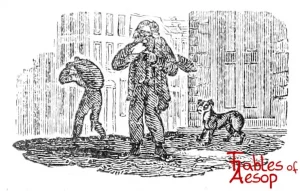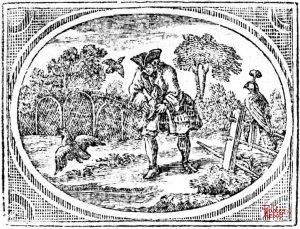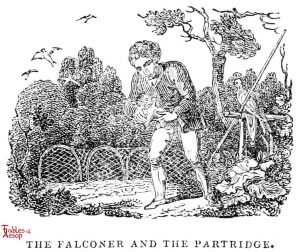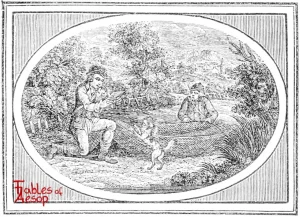The Partridge begged for life from the hunter by saying he would deliver many of his fellows instead. The hunter would have nothing of this betrayal.
A traitor undermines the foundations of society.

Townsend version
A fowler caught a Partridge and was about to kill it. The Partridge earnestly begged him to spare his life, saying, “Pray, master, permit me to live and I will entice many Partridges to you in recompense for your mercy to me.” The Fowler replied, “I shall now with less scruple take your life, because you are willing to save it at the cost of betraying your friends and relations.”

Samuel Croxall (The Falconer and the Partridge)
A FALCONER having taken a Partridge in his nets, the bird begged hard for a reprieve, and promised the man, if he would let him go, to decoy other Partridges into his net. No, replies the Falconer, I was before determined not to spare you, but now you have condemned yourself by your own words: for he who is such a scoundrel as to offer to betray his friends, to save himself, deserves, if possible, worse than death.
THE APPLICATION
However it may be convenient for us to like the treason, yet we must be very destitute of honour not to hate and abominate the traitor. And accordingly, history furnishes us with many instances of kings and great men, who have punished the actions of treachery with death, though the part they had acted had been so conducive to their interests, as to give them a victory, or perhaps the quiet possession of a throne. Nor can princes pursue a more just maxim than this; for a traitor is a villain of no principles, that sticks at nothing to promote his own selfish ends: he that betrays one cause for a great sum of money, will betray another upon the same account; and therefore it must be very impolitic in a state to suffer such wretches to live in it. Since then this maxim is so good, and so likely at all times to be practised, what stupid rogues must they be, who undertake such precarious dirty work! If they miscarry, it generally proves fatal to them from one side or the other; if they succeed, perhaps they may have the promised reward, but are sure to be detested, if suffered to live, by the very person that employs them.

JBR Collection
A Partridge, being taken in the net of a Falconer, begged hard of the Man to be set free, and promised if he were let go to decoy other Partridges into the net. “No,” replied the Falconer; “I did not mean to spare you; but, if I had, your words would now have condemned you. The scoundrel who, to save himself, offers to betray his friends, deserves worse than death.”

Thomas Bewick (The Fowler and The Partridge)
A Fowler having taken a Partridge in his nets, the bird begged hard for a reprieve, and promised the man, if he would let him go, to decoy the other Partridges into his snares. No, replies the Fowler, if I had before been undetermined what to do with you, now you have condemned yourself by your own words: for he who is such a scoundrel as to offer to betray his friends, to save himself, deserves if possible worse than death.
APPLICATION.
To betray our friends is one of the blackest of crimes; and however much traitors may suppose they recommend themselves by their successful acts of treachery, they will find that those who employ them as useful instruments in any dirty business of faction or party, are shocked at the baseness of their minds; and however convenient it may be to “like the treason, the traitor will be despised.” History furnishes us with many instances of kings and great men who have punished the actors of treachery with death, though the part they acted had been so conducive to their interests as to give them a victory, or perhaps the quiet possession of a throne: nor can princes pursue a more just maxim than this, for a traitor is a villain, and sticks at nothing to promote his own selfish ends. He that will betray one master for a bribe, will betray another on the same account. It is therefore impolitic in any state to suffer such wretches to live under its protection. Since then this maxim is so good, and likely at all times to be acted upon, what stupid rogues must they be who undertake such precarious dirty work!


L’Estrange version
A fowler had taken a partridge, and the bird offer’d her self to decoy as many of her companions into the snare as she could, upon condition that he would but give her quarter. No, says he, you shall dye the rather for that very reason, because you would be so base as to betray your friends to save your self.
Moral
Of all scandalous and lewd offices, that of a traytor is certainly the basest; for it undermines the very foundations of society.

Perdix et Auceps
Auceps, retibus extensis, captabat perdicem. Volucris illa, captata, supplicabunde illum rogabat ut se demitteret, promittens se in retia plurimas aves allecturam. Cui auceps, “Nequaquam hoc faciam, nam procul dubio me decipies, quae sodales tuos proditura es.”
Moral
Fabula docet numquam fidem illis adhibituram, qui alios semel fefellerunt.
Perry #265


